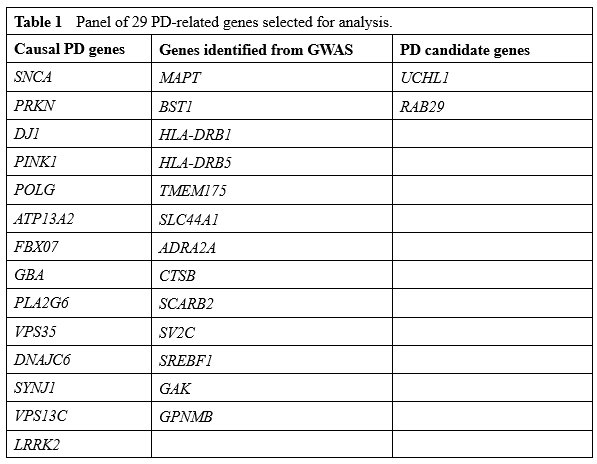Category: Parkinson's Disease: Genetics
Objective: We aim to study the rare variant burden in a panel of 29 Parkinson’s disease (PD) candidate genes (Table 1) in a cohort of Chinese PD patients.
Background: Although PD is largely a sporadic disease, genetics likely plays an important etiological role, with heritability estimates at 22-27% [1]. Much of the heritability remains unexplained despite genome-wide association studies revealing many common risk variants [1]. Various candidate genes have been proposed based on genetic studies and putative biological pathways, and rare variants in these genes may contribute to the missing heritability [2]. However, most existing data were derived from western population.
Method: Targeted exome sequencing (TES) of 29 PD candidate genes was performed on Chinese PD patients from two neurology clinics in Hong Kong. Data on the same genes were extracted from prior whole exome sequencing (WES) of a cohort of 699 local healthy control with mean age of 55.5 years. Rare variants were defined by (1) minor allele frequency <0.05 or novel (not previously reported) in East Asians from The Genome Aggregation Database (gnomAD); and (2) high-confidence in Loss-of-Function Transcript Effect Estimator (LOFTEE) or Combined Annotation Dependent Depletion (CADD) >15. Burden of rare variants identified was then compared between cases and controls using student’s t and chi-squared tests.
Results: A total of 311 (170 male) PD patients were recruited, with mean age 66.5 years, mean age of onset 60.5 years, and mean disease duration 6.5 years. Sixteen (5.1%) were early-onset (<45 years) and 13 (4.2%) reported positive family history. A total of 174 rare variants were identified in 27 of 29 genes with 48 being novel. Mean rare variant burden was higher in PD patients than controls (1.178 vs 0.478, p=1.26×10-24). More controls have no rare variants than PD patients (440 (63%) vs 89 (29%)); 34% (107) PD patients have multiple (>1) rare variants, compared to 9% (64) in controls (p=6.28×10-75).
Conclusion: Rare variant burden in a panel of 29 PD-related genes is increased in a cohort of largely sporadic and late-onset PD patients than in healthy controls from a Chinese population, suggesting that rare variants in PD-related genes play an important role in the risk of sporadic PD. Understanding the biological pathways these genes are involved in may help reveal potential disease-modifying therapeutic targets.
MDS abstract – table 1.png
References: [1] M. A.Nalls et al., “Identification of novel risk loci, causal insights, and heritable risk for Parkinson’s disease: a meta-analysis of genome-wide association studies,” Lancet Neurol., vol. 18, no. 12, pp. 1091–1102, 2019, doi: 10.1016/S1474-4422(19)30320-5.
[2] A.Hall, S.Bandres-Ciga, M.Diez-Fairen, J. P.Quinn, andK. J.Billingsley, “Genetic risk profiling in parkinson’s disease and utilizing genetics to gain insight into disease-related biological pathways,” Int. J. Mol. Sci., vol. 21, no. 19, pp. 1–15, 2020, doi: 10.3390/ijms21197332.
To cite this abstract in AMA style:
RWH. Ho, ZW. Xiong, RCN. Lo, HF. Liu, PWL. Ho, SL. Ho, SYY. Pang. Rare Variant Burden is Increased in Sporadic Late-onset Chinese Parkinson’s Disease Patients [abstract]. Mov Disord. 2024; 39 (suppl 1). https://www.mdsabstracts.org/abstract/rare-variant-burden-is-increased-in-sporadic-late-onset-chinese-parkinsons-disease-patients/. Accessed July 14, 2025.« Back to 2024 International Congress
MDS Abstracts - https://www.mdsabstracts.org/abstract/rare-variant-burden-is-increased-in-sporadic-late-onset-chinese-parkinsons-disease-patients/

